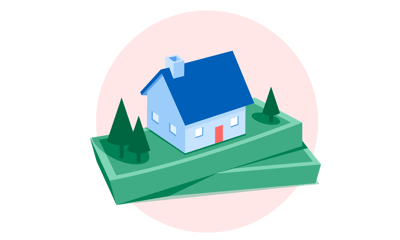What Is Real Estate?




The term ‘real estate’ gets used when we talk about homes, land, investments and even jobs. But what exactly is real estate?
Most Canadians use ‘real estate’ to refer to land and buildings, but there’s a little more to it.
NerdWallet's First-Time Home Buyer Guide
If you have questions about buying your first piece of real estate, our guide for first-time home buyers in Canada can answer them.
How real estate is defined
Real estate is a term used to refer to "real property", which the Government of Canada defines as “land, mines, minerals, buildings, and fixtures on, above or below the surface, and any interest therein, both in Canada and abroad.”
A simpler way to say it is that real estate is land and whatever's grown or built on it. "Real estate" can also describe the industry agents, brokers, investors, mortgage lenders and developers work in.
A piece of real estate is often categorized based on its current or intended use. These categories include:
Residential real estate: Houses, condos, townhouses, duplexes and mobile homes.
Recreational real estate: Second homes, cabins and cottages.
Rural real estate: Farms, ranches and land.
Commercial real estate: Shopping malls, office buildings, apartments and industrial spaces.
Institutional real estate: Hospitals, schools, airports and churches.
Ways to own real estate
Owner-occupied real estate
Many individuals get involved with real estate by looking for a home to live in. These owner-occupiers typically opt for residential, recreational or rural real estate.
Investment real estate
You can also get into real estate by buying property as an investment, typically with the intent of renting it out. Investment properties are popular among Canadians and can be a reliable source of passive income.
When it comes to investment properties, there are plenty of options.
Residential investment properties include homes, apartments or condos. You can also purchase and lease out a commercial real estate to a business. Common commercial properties include retail, restaurant and industrial spaces. Some investors opt for mixed-use real estate, which combines space for businesses on certain floors and residential units on others.
Buying and owning a rental property means following a unique set of rules. Study up on the municipal and provincial regulations that apply to landlords in your area. Also, plan on speaking to a lender or mortgage broker about the financing requirements that come with owning investment real estate.
Financing a real estate purchase
Unless you’re paying for real estate with cash, you’ll have to get a mortgage to complete your purchase.
Where you get your mortgage might depend on what kind of real estate you’re buying. Most banks offer funding for residential and commercial real estate purchases, but smaller lenders might only deal with residential buyers.
If you’re buying commercial real estate, you’ll want to work with a mortgage broker who has specific commercial lending experience.
Best mortgage rates in Canada
Compare offers from Canada’s top mortgage lenders and brokers.
Other real estate and real estate-related terms to know
Real estate agent: A licensed professional that helps individuals buy or sell a home.
Real estate broker: A real estate agent with additional accreditation that allows them to run a real estate brokerage.
Real estate investment trust: An company that pools its commercial real estate holdings into a fund investors can buy shares in.
Real estate bubble: A real estate bubble occurs when home prices inflate rapidly and are at risk of an equally sudden reversal — the bursting of the bubble.
MLS: A multiple listing service is where real estate associations, like the Canadian Real Estate Association, allow their member agents to post detailed listings of homes for sale. Realtor.ca is Canada’s primary MLS.
Cap rate: Short for “capitalization rate”, cap rate is a formula that helps investors estimate the profitability of a piece of real estate by comparing rental income and a property’s current market value.
Frequently asked questions
What is real estate?
What is real estate?
Real estate is land and whatever’s on top of or below it. Houses, condos, warehouses, mines, schools and hospitals are all examples of real estate.
What’s the difference between a real estate agent and a real estate broker?
What’s the difference between a real estate agent and a real estate broker?
Both real estate agents and real estate brokers help their clients buy and sell real estate, but a broker has taken extra training and is qualified to run a real estate brokerage.
DIVE EVEN DEEPER

 Clay Jarvis
Clay Jarvis
 Clay Jarvis
Clay Jarvis